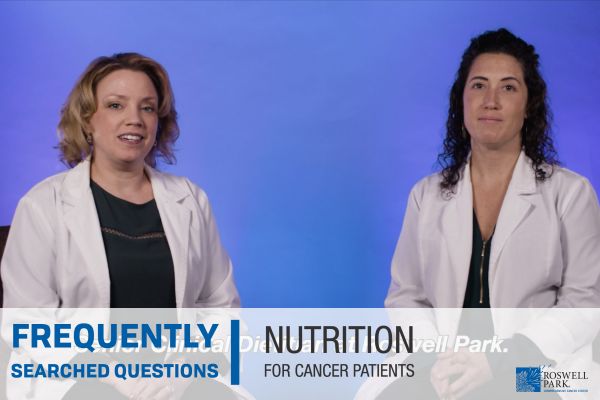Did you know that what you eat can lower your risk of getting cancer?
It can also affect the way you feel and how fast you'll recover when you're in treatment for cancer — and improve your chances for staying healthy into the future.
When it comes to nutrition, cancer patients have specific needs. Those needs can differ from person to person, depending on the type of cancer, the type of treatment and other factors. That's why Roswell Park's registered dietitians need specialized knowledge to care for our patients and survivors.
Most people are probably aware that nausea and vomiting can make eating difficult for patients receiving chemotherapy or radiation treatments, and that can lead to poor nutrition, says Linda Leising, RDN, CSO, CDN, Senior Clinical Dietitian. Nutrition-related side effects may also include bowel irregularities and changes in the way things taste. "And sometimes people's bodies just aren't able to absorb nutrients, either because of the kind of cancer they have or the side effects of treatment," says Leising. "For some people, these problems are short-term; for others, they're long-term."
Other cancer patients may experience unintended weight gain, especially breast and prostate cancer patients who are receiving long-term hormonal therapy. "Weight gain can lead to obesity, which increases the risk of cancer," Leising explains. "We want to prevent that from happening."
Patients who are new to Roswell Park receive a welcome packet that includes contact information for the Nutrition Department and things to watch for that may suggest the need for a meeting with one of the dietitians: "If they're losing weight without trying, if they're having difficulties with eating, they need to talk with their physician about that. Left untreated, these issues can lead to muscle mass loss, weakness, and delays in their cancer treatment plan. We can give them nutrition guidance and follow them as they go through treatment."
Leising says Roswell Park's medical teams regularly seek advice from the dietitians, because "nutrition therapy can be very complicated, depending on the medical situation and on medications the patient is receiving. We can provide a lot of expertise and assistance in that area."
Never miss another Cancer Talk blog!
Sign up to receive our monthly Cancer Talk e-newsletter.
Sign up!Specialists in Oncology Nutrition
To provide the highest level of care and stay current with the latest science-based recommendations related to nutrition and cancer, three of Roswell Park's 10 registered dietitians have earned board certification as Specialists in Oncology Nutrition (CSO), and others are preparing to take the CSO exam. "Preparing for the exam is quite intense," says Leising. Among other requirements, before taking the exam, a candidate must complete at least 2,000 hours of clinical experience in oncology nutrition.
"We're expected to understand the way many anti-cancer treatments work," explains Leising. "It's not just a matter of knowing that the patient is getting chemotherapy or immunotherapy — it's understanding what a particular treatment can do, how it works, and the most common nutrition-related side effects.
"I've been at Roswell Park for almost 20 years, and I found it very challenging to prepare for and pass the exam."
Helping People 'Embrace a Healthy Lifestyle'
Leising's team continues to support and guide survivors after treatment is complete. One dietitian is assigned specifically to the Survivorship & Supportive Care Center, and the Nutrition Department is developing a program to encourage healthy eating and weight control for survivors, to promote their overall health and reduce the risk of recurrence or a second cancer. "People seek us out for help while they're getting treatment, but they don't always think of a dietitian to help them with cancer prevention or long-term survivorship," says Leising. "We're making efforts to branch out more into prevention and long-term survivorship."
As part of that goal, the department hosts nutrition programs through Roswell Park's Wellness Wednesday series. Thanks to a generous grant from Hyundai Hope on Wheels to the Pediatric Hematology Oncology Department, last year the Nutrition team helped produce five short videos about healthy eating, including two featuring cooking demonstrations. The videos, which star Roswell Park pediatric patients and a registered dietitian, are now shown on information screens in the pediatric center.
"We would like to do more things like that," says Leising. "We want to assist people in embracing a healthy lifestyle."
- General dietary questions? Check out our Clinical Nutrition pages for information about healthy eating strategies, managing side effects, and our registered dietitian services.
- If you're a Roswell Park patient and would like to meet with one of our dietitians, please contact your medical team.



